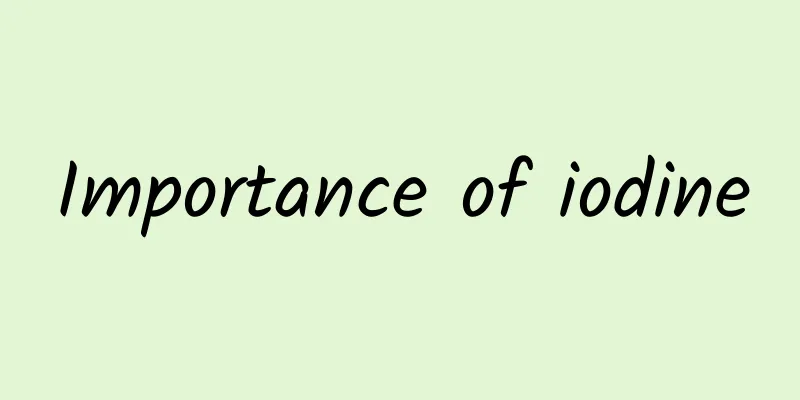Importance of iodine

|
May 15th is the National Iodine Deficiency Disease Prevention and Control Day. Iodine is a micronutrient necessary for metabolism and growth and development, and is the main raw material for the synthesis of thyroid hormones by the human body. Its importance to the human body is self-evident. What are the symptoms and hazards of iodine deficiency? How to effectively prevent it? Let's learn about it together. Iodine exists in the human body as a nutrient like protein, fat, sugar, vitamins, etc., and is known as the "intelligence element". Although its content in the human body is only 20-50 mg (average 30 mg), it is a health guarantee for maintaining normal thyroid function, promoting metabolic processes, maintaining normal growth and development of the body, and maintaining normal nervous system function and intellectual development. Iodine deficiency can cause iodine-deficiency goiter, which is what we often call "big neck disease". Dangers of iodine deficiency: 1. Iodine deficiency during the fetal period. All the iodine needed by the fetus comes from the mother. If there is severe iodine deficiency during pregnancy, miscarriage, premature birth, stillbirth and congenital malformations may occur. 2. Iodine deficiency in the neonatal period will affect the normal development of the brain and may cause problems such as subclinical disease, intellectual disability, deafness, and growth and development disorders. 3. Iodine deficiency in children and adolescents can cause goiter, simple deafness, intellectual impairment and growth and development problems in children. 4. Iodine deficiency in adulthood can cause goiter, hypothyroidism, fatigue, lack of concentration and decreased work efficiency. The main symptoms of iodine deficiency are: The iodine intake of the human body is obtained from water and animal foods. There are obvious regional differences in iodine, which affects the level of human intake. Iodine deficiency disease occurs when the external environment lacks iodine, resulting in insufficient iodine intake in the human body. A general term for a series of diseases: 1. Endemic goiter: It refers to the enlargement of the thyroid gland to varying degrees, with the neck becoming thicker and in severe cases, difficulty breathing and swallowing may occur. 2. Endemic cretinism: refers to mental retardation, deaf-muteness, growth retardation, motor nerve dysfunction, spastic paralysis of the lower limbs, and symptoms of hypothyroidism (myxedema, slow reaction, drowsiness, lack of energy, fear of cold, and low appetite). 3. Subclinical tingling disease: refers to mild intellectual disability, mild hearing and language impairment, mild neuromotor disorder, mild physical development retardation, and hormonal hypothyroidism. How to supplement iodine scientifically: To prevent the above diseases, the best way is to consume iodized salt. Consuming iodized salt is not only safe, effective, and easy to promote, but also conforms to the principle of trace, long-term, and daily iodine supplementation. Of course, the more iodine you consume in iodized salt, the better. In daily life, you need to control your salt intake, and it should not exceed 6 grams per day. The World Health Organization recommends that adults consume 150-3300 micrograms of iodine per day. In addition to consuming iodized salt, you can also eat more kelp, jellyfish, seaweed, seaweed, spinach, celery and other foods to supplement iodine in your daily life. Moreover, iodine supplementation cannot be generalized for different groups of people, and you need to use "addition and subtraction" skillfully. These groups need to be “added” 1. Pregnant women: Pregnant women should ensure that their daily iodine intake is 200-300 micrograms. 2. Infants and young children: Iodine supplementation is most important before the age of three. 3. Adolescents: During the period of physical development and accelerated metabolism, the need for iodine supplementation is greater. These people need to do "subtraction" 1. Residents in high iodine areas The daily iodine intake of residents in high-iodine areas in my country is above 800-1000 micrograms, so there is no need for iodine supplementation. Excessive iodine intake can easily cause hyperthyroidism, thyroid tumors, thyroiditis, thyroid cysts, etc. 2. Hyperthyroidism patients Patients with autoimmune thyroid diseases (common ones include hyperthyroidism, thyroiditis, etc.) do not need to consume or consume less iodized salt according to the doctor's advice due to treatment needs. |
<<: “Guide to Eating Out Safely” Series: Will your stomach agree to eating barbecue?
>>: What should I do if my child has an upper respiratory tract infection?
Recommend
What is the approximate value of ectopic pregnancy?
I believe that everyone should have a certain und...
What should I eat when I have a cold?
During menstruation, women will experience a rath...
How to treat lobular hyperplasia pain
For women, the pain caused by lobular hyperplasia...
Is it normal to have your period a week early?
In daily life, many girls don’t know much about m...
Side effects of anesthesia for abortion
Nowadays, many young women do not pay attention t...
What are the symptoms of gigantic breast disease in girls?
Perhaps many people do not know the existence of ...
When do mulberries mature? (Flowers bloom from March to May, and fruits mature from April to June)
...
Standard female breast picture
Every woman hopes to have a pair of plump and ela...
At what age do girls' voices change?
It is often used to describe some girls as having...
Scary! Vegetables tied with tape are toxic, with formaldehyde exceeding the standard by 10 times?
Expert of this article: Huang Shan, Deputy Direct...
What are the ways to maintain the uterus?
No matter what you do, you have to use good metho...
If your eyes hurt and you have these symptoms, don’t take it lightly!
Author: Yang Diya, glaucoma and cataract speciali...
【Health Lecture】Gastrointestinal discomfort is actually caused by anxiety
Recently, we received a patient like this in the ...
What is the cause of brown leucorrhea and itching?
Some friends often experience symptoms of brown a...
Why does my lower abdomen hurt and I have a lot of vaginal discharge?
When women have abnormal leucorrhea, they should ...









